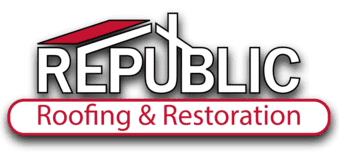Asphalt Shingle Recycling with Republic Roofing. In an era where sustainability and environmental consciousness are at the forefront of construction practices, the roofing industry is making significant strides in promoting eco-friendly solutions. One such advancement is asphalt shingle recycling, a practice that not only diverts roofing waste from landfills but also reduces the need for virgin materials and conserves valuable resources. In this article, we’ll explore the concept of asphalt shingle recycling, its environmental benefits, and how it contributes to sustainability in roofing.

Understanding Asphalt Shingle Recycling:
Asphalt shingles have been a popular roofing material in the United States for decades, thanks to their affordability, durability, and ease of installation. However, the disposal of old or damaged shingles has been a growing environmental concern. Historically, the majority of discarded shingles ended up in landfills, contributing to the accumulation of construction waste and taking up valuable landfill space.
Asphalt shingle recycling is a practice that addresses this issue by repurposing old shingles into new products or materials. It involves collecting, processing, and reusing discarded asphalt shingles in a sustainable manner.
The Recycling Process:
The asphalt shingle recycling process typically involves the following steps:
Collection: Old or removed asphalt shingles are collected from construction and demolition sites, roofing contractors, or recycling centers. Shingles should be free of contaminants such as wood, metal, and plastic.
Sorting and Cleaning: The collected shingles are sorted to separate asphalt shingles from other debris. Cleaning processes remove any remaining contaminants.
Shredding and Grinding: The cleaned shingles are then shredded or ground into small pieces, creating a material known as “recycled asphalt shingle” or RAS.
Mixing with Asphalt: RAS is mixed with fresh asphalt to create recycled asphalt pavement (RAP) or recycled asphalt shingle material (RASM). This mixture can be used in various road construction applications.
Manufacturing New Shingles: In some cases, RAS can also be used in the manufacturing of new asphalt shingles, replacing a portion of the virgin asphalt.
Environmental Benefits of Asphalt Shingle Recycling:
Waste Reduction: Recycling old asphalt shingles reduces the volume of roofing waste sent to landfills, alleviating the burden on these sites and extending their lifespan.
Resource Conservation: By reusing asphalt shingles, the demand for virgin asphalt is reduced, conserving valuable natural resources like oil and aggregates.
Energy Savings: Recycling shingles consumes less energy than manufacturing new asphalt from scratch. This results in reduced greenhouse gas emissions and a smaller carbon footprint.
Lower Costs: The use of recycled asphalt shingles in road construction and maintenance can lower material costs for these projects, benefiting both government agencies and taxpayers.
Sustainable Roofing Practices: Asphalt shingle recycling aligns with sustainable roofing practices, promoting responsible resource management and environmental stewardship within the roofing industry.
Sustainable Roofing with Recycled Shingles:
The incorporation of recycled asphalt shingles in roofing projects offers several advantages:
Environmental Certification: Some roofing products made with recycled content, including recycled shingles, may qualify for environmental certifications such as LEED (Leadership in Energy and Environmental Design), contributing to sustainable building practices.
Energy Efficiency: Roofing materials made with recycled asphalt shingles often exhibit good thermal performance, helping to improve energy efficiency in buildings by reducing heat transfer.
Durability: Recycled asphalt shingles are known for their durability and resistance to harsh weather conditions, making them a reliable choice for long-lasting roofs.
Cost Savings: In some cases, recycled shingles may be more cost-effective than traditional roofing materials, providing an economical roofing solution.
Challenges and Considerations:
While asphalt shingle recycling offers numerous environmental benefits, there are also challenges and considerations to keep in mind:
Quality Control: The quality of recycled asphalt shingles can vary, depending on factors such as the age and condition of the shingles. Ensuring consistent quality is essential for their successful reuse.
Market Demand: The demand for recycled asphalt shingles in various applications, including road construction, can fluctuate. A stable market is crucial to encourage and sustain recycling efforts.
Regulations and Standards: Regulatory and industry standards for recycled asphalt shingles vary by location. Compliance with local regulations is essential to ensure responsible recycling practices.
Conclusion:
Asphalt shingle recycling is a significant step toward a more sustainable and environmentally responsible roofing industry. By diverting roofing waste from landfills, conserving resources, and reducing energy consumption, asphalt shingle recycling contributes to a greener and more eco-friendly approach to roofing. For homeowners, contractors, and builders looking to embrace sustainable roofing practices, exploring recycled asphalt shingle options can be a promising step toward a more environmentally conscious future in construction and roofing.
For more information, contact Republic Roofing at 901-437-5278. We service Lakeland, Germantown, Bartlett, Memphis, and Collierville, TN areas.
